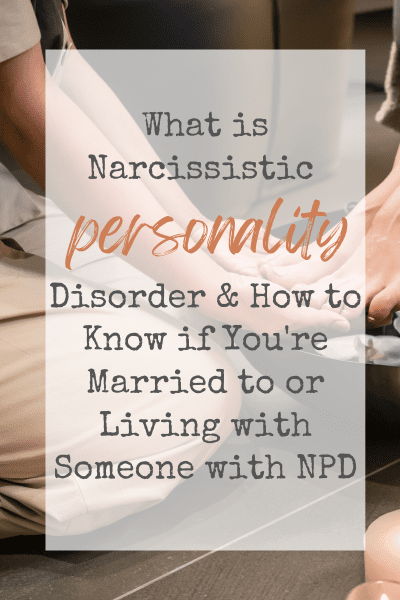

Why Use the Term Narcissistic Personality Disorder?
(Note…counselors have favored replacing “narcissistic abuse” with “coercive control” in many situations. For the sake of simplicity, I’ll leave what is written and leave that change to the readers’ discretion.)
Having walked very closely with several women in narcissistic, abusive marriages, there are some important things I want to clarify surrounding the term itself, which some Christians do not like to acknowledge, especially the “disorder” part.
Most of us have some degree of narcissism (self-love) but I’m referring in these posts to a person whose extreme narcissism has caused disruption in the lives of the people around them, which clinically classifies it as a “disorder.” I will say “narcissist” hereafter for simplicity.
I am not describing typical relationships or marital conflict where two normal people have an issue to work out, both admitting their areas of weakness and working toward conflict resolution. This is something completely different and the narcissist does not behave like a normal person.
Does the Bible Address it?
Many Christians and Christian counselors do not like to use the term narcissistic because they feel it’s important to simply address the sin at the root of the problem. I disagree with the rejection of the term because terms help us to classify things clearly and simply. There is a biblical name for the narcissist. It’s called a “fool” and “scoffer.” The secular name that has been given to this type of personality trait (even though sin is certainly at the root) differentiates them from others in a meaningful way that is easier to understand and discuss, because there are common, recognizable traits associated with the name.
If I say I’m a diabetic, you know what my symptoms are without my explaining it, and in general, how it needs to be treated. If I just say “I’m sick” but never get specific, it’s much more difficult to diagnose. Terms are important.
What is a narcissist (again, the extreme form, considered as a disorder):
- One who has an enlarged sense of self and almost no empathy for other people. People, to them, are a means of getting something they want, usually to feel powerful or admired.
- They show great frustration (sometimes rage) at the slightest criticism. They often take something not meant to be critical as criticism, surprising the one who offered it. This causes a “walking on eggshells” effect.
- They have an unbelievable ability to turn arguments back onto you. They can be dead wrong, but by the end of the manipulation, you are questioning whether you really understood the situation clearly. Taking blame for anything is something they rarely ever do, unless it serves them to manipulate a situation. They will blame you, however, for things, even if they are irrational. They will blame you for their anger too and expect you to apologize.
- They might be generous to those outside their home, or do acts of charity, but it is usually to be admired, not because they genuinely care. At home there is very little kindness or acts of service.
- They will use your weaknesses against you.
- They want to do what they want to do without any opposition. Opposition triggers the shower of insults/rage and they train their victims to become afraid of rocking the boat. Most of them end up married to peace-makers for this reason.
- They are usually charming, friendly and naturally charismatic (although not all are). Often people outside the family have a hard time believing they are treating their spouse/children in a harmful way.
- Things are usually good if you don’t ever confront the narcissist, disagree with him, embarrass him or expect anything from him.
- They are bullies.
- They have a sadistic nature wherein they are not moved by your tears or pain. They genuinely can’t feel empathy.
- Often people married to (or living with) narcissists feel like they are going crazy and experience extreme degrees of stress.
- If they are backed into a corner, they will easily play the victim.
Many women (and some men) are in a marriage like this but haven’t ever put a name to what they are dealing with. I think it’s another important reason to use the term. There is simply something comforting to a person when they see their problem spelled out and named. It’s confusing when you’re in it.
One of the hardest parts about getting help is that often people do not believe that the friendly, charming, successful person you are describing is capable of abuse. The narcissist has an uncanny ability to hold the victim in check-mate, creating what feels like a helpless situation. They are clever and usually quite articulate, easily manipulating others. And they have no problem lying. I’ve even seen one spouse accuse the other of being a narcissist (and was believed by all) when she was, in fact, the narcissist.
And the sad reality is, there are no easy answers, even if you can find good counselors who believe you. I will be discussing what I think about what to do if you find yourself married to a narcissist, and also how to handle other family members who are (parents, children, etc). If you have any other helpful descriptions to add to this list, or comments in general, I’d love to hear in the comment section.
(For additional reading, I highly recommend the book, Unholy Charade: Unmasking the Domestic Abuser in the Church)
Read Part2: What the Church and Counselors Need to Understand About Narcissistic Abuse







